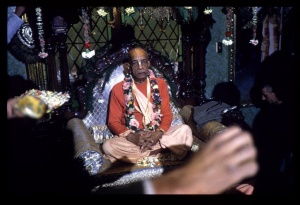SB 4.29.22

A.C. Bhaktivedanta Swami Prabhupada
TEXT 22
- kāla-kanyā jarā sākṣāl
- lokas tāṁ nābhinandati
- svasāraṁ jagṛhe mṛtyuḥ
- kṣayāya yavaneśvaraḥ
SYNONYMS
kāla-kanyā—the daughter of Time; jarā—old age; sākṣāt—directly; lokaḥ—all living entities; tām—her; na—never; abhinandati—welcome; svasāram—as his sister; jagṛhe—accepted; mṛtyuḥ—death; kṣayāya—for destruction; yavana-īśvaraḥ—the King of the Yavanas.
TRANSLATION
What was described as Kālakanyā should be understood as old age. No one wants to accept old age, but Yavaneśvara [Yavana-rāja], who is death, accepts Jarā [old age] as his sister.
PURPORT
Encaged within the body, the living being accepts Kālakanyā, old age, just before death. Yavaneśvara is the emblem of death, Yamarāja. Before going to the place of Yamarāja, the living entity accepts Jarā, old age, the sister of Yamarāja. One is subjected to the influence of Yavana-rāja and his sister due to impious activity. Those who are in Kṛṣṇa consciousness and are engaged in devotional service under the instructions of Nārada Muni are not subjected to the influence of Yamarāja and his sister Jarā. If one is Kṛṣṇa conscious, he conquers death. After leaving the material body, he does not accept another body that is material but returns home, back to Godhead. This is verified by Bhagavad-gītā (BG 4.9).